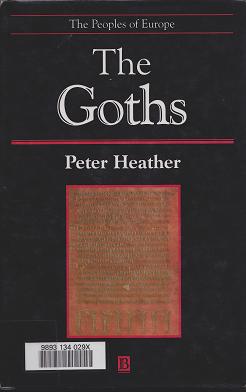
The Goths
Peter Heather
358 pages including index
published in 1996
Most of Peter Heather’s professional output has, in one way or another, featured the Goths. Usually this has been in the context of their contribution to the fall of the Roman Empire in the west, which Heather has long argued they played a central role in. In The Goths his focus is slightly different, more concerned with the Goths themselves than with how they interacted with the Roman Empire, though that still of course is an important part of their story. The Goths is an entry in the Blackwell series The Peoples of Europe and is meant as a one volume overview of their entire history, for people largely unfamiliar with them. As Heather mentions in his introduction, the last book to attempt this was published in 1888, so it was high time for an update.
Heather’s divides his book in three main parts, preceded by an introductionary chapter. In this he discusses why the Goths were important and the problem of social identities, where the old assumptions of unchanging peoples recognisable by some checklist of unique features had been challenged in the 1950ties and 60ties by new research showing how individuals could change their identity when advantageous. Heather applies a synthesis of these approaches to the Goths, arguing that while there was such a thing as a Gothic group identity, it was fluid enough for non-Goths to join into and for the group as a whole to adapt to changing circumstances. He then goes on to first explore the origins of the Goths, thentheir invasion and defeat of the East Roman Empire and further wanderings through the Balkans into Italy and Gaul and finally looks at the history of the two Gothish kingdoms established on parts of the Western Empire. In all three parts Heather puts the search for Gothish identity central.
